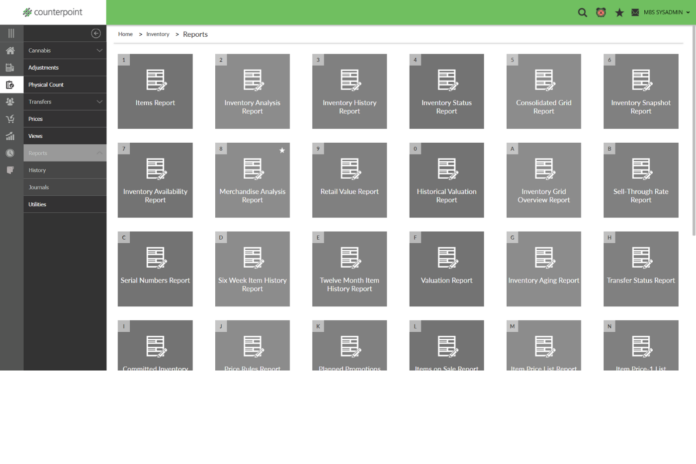Supply chain issues rocked the cannabis market at the beginning of the COVID-19 pandemic, and three years later, many operators are still dealing with the fallout. Major shipment delays had cannabusiness owners scrambling to find high-quality products at reasonable wholesale prices. As a direct result, countless consumers across the country were disappointed by the lack of product availability and, in worst-case scenarios, turned away from storefronts they once trusted for good.
While this era of exiguity was anything but ideal, it succeeded in exposing the cracks in the retail buying process, forcing the industry to reckon with the fact that streamlined solutions and backup plans should have been in place well before the shortages hit. Operators now know they need to order smarter and have a wider variety of products on hand. These realizations have resulted in a new emphasis on preventative planning, which is why inventory and point-of-sale (POS) tools that use artificial intelligence (AI) to get ahead of potential setbacks have become crucial.
Mariner Business Solutions has offered POS and inventory-control software with purpose-built hardware to operators since 1993, and the company’s latest AI-powered innovations bring much-needed operational efficiency to retailers. From streamlined inventory analytics that help retail buyers understand how to order for their stores to advanced POS technology that allows any budtender to make product recommendations with ease and accuracy, Mariner’s business tools are invaluable integrations for operators who never want to tell another customer, “We don’t have what you need in stock today.”
Staying in compliance with inventory control
Before Mariner Business Solutions introduced AI to their offerings, the company specialized in software and hardware that helped cannabis businesses meet compliance requirements.
Mariner’s CannaPoint software is dedicated to seed-to-sale cannabis operations. The radio frequency identification (RFID) software solution aids medical and adult-use retail sales across the country while helping cultivators, processors, and retailers manage their inventory in a way that meets state regulatory reporting requirements.
“Our business’s sturdiest area of expertise is inventory control. It’s something we continue to make stronger all the time,” said General Manager Terry Buff. “And keeping in strict compliance with federal regulations ties directly into inventory control—especially in markets with stores that offer both adult-use and medicinal products. You have to make sure you’re selling the right products to the right customer, and inventory control allows you to keep track of each item and make sure it gets to the person who needs it.”
With the use of RFID, Mariner’s clients achieve compliance with ease. Tracking is more accurate and reliable, and the speed at which they take stock of their product arsenal increases significantly. This time-saving makes a huge difference for operators, especially when it comes to regulatory requirements.
“Whenever a retailer makes a sale, that action has to be logged and sent to the regulatory agency. And at the end of each day, you have to make sure the information the state has accurately matches up with what you have in your store,” Buff said. “If you have RFID, you can take your whole store’s inventory in a matter of minutes with one person. That’s been really useful for compliance, but the next thing we’re looking at is being able to make projections. And that’s where AI comes into play.”
From following trends to forecasting them
Proper inventory tracking is non-negotiable for operators who want to succeed in both sales and compliance, but if 2020’s supply chain issues taught us anything, it’s that tracking on its own isn’t enough anymore. Instead, operators need to be able to utilize their tracking to forecast so they can get ahead of potential setbacks by knowing what sells, what doesn’t, and what back-up products they should have in mind for crowd favorites that might unexpectedly be unavailable.
As Buff mentioned, this is where AI comes into play. Introducing AI to POS systems and inventory control means operators can take those stock-and-sales analytics and do something with them beyond placing repeat orders and ensuring compliance.
“With AI, we can analyze our sales data and massage it a lot better. We’re able to look at past history and see not only what was sold on a daily or monthly basis, but also what we sold by the year,” Buff said. “We can also examine data analytics to determine decision-making—like, if we make this change in how we sell, our profit margin will be higher. There are tons of ways to take that intelligent information, really absorb the data, and get some pretty accurate projections for the future.”
As an example, Buff mentioned 4/20, when sales are pretty much guaranteed to soar for retailers. With Mariner’s AI technology, operators can look at historical information and obtain actionable insights about those high-volume days. That data subsequently informs how business owners should approach the upcoming holiday, like what sort of products should be highlighted or which consumer demographic should be targeted from a marketing perspective.
Mariner’s solutions also help businesses avoid overstocking—the opposite of supply-chain shortage, but potentially just as damaging. When operators order too much at once, they’re more likely to have to discount those products to get them to sell. Or, in worst-case scenarios, they end up having to write them off as a loss.
Optimized inventory tracking for increased sales
Mariner’s AI doesn’t just help businesses meet compliance needs and maximize their inventory game. The company’s intelligent software also aids the POS side of things, ensuring retailers have no gaps in their customer service and marketing strategies.
“For the sales side, our goal is to increase the average ticket sale for retailers,” Buff said. “When you buy something on Amazon, you’re shown recommendations for other products that customers have bought along with what you’re purchasing. We’re doing something similar with our POS. If you’re listed in a retailer’s database as a customer and you come up to the register and say, ‘Hi, I want to buy this,’ but the store doesn’t have it in stock, the budtender can pull up your information and say, ‘We don’t have that, but based on what you’ve purchased in the past, I have some options for you that are similar to what you’re looking for.’”
Of course, retailers with great customer service likely are doing this already, but on days like 4/20 when everyone is feeling understaffed, understocked, and overwhelmed with customers, having clear recommendations budtenders can read straight from the POS screen saves staff time, energy, and the risk of making a poor suggestion that does not drive sales or increase customer satisfaction.
“Essentially, our AI will help operators project their sales better, which, in turn, helps them purchase smarter and have more products on hand,” Buff said. “You can rest assured you’re maintaining the correct inventory for your operations and aren’t at risk of overstocking your store. I think the solutions tie together in that aspect: not only can I project sales better, but I know exactly how much inventory I need to achieve my goals, which means I am better prepared to purchase for my store in the future.”












